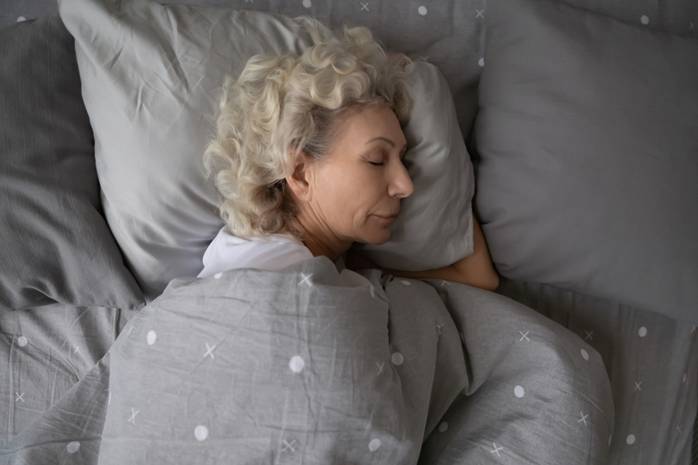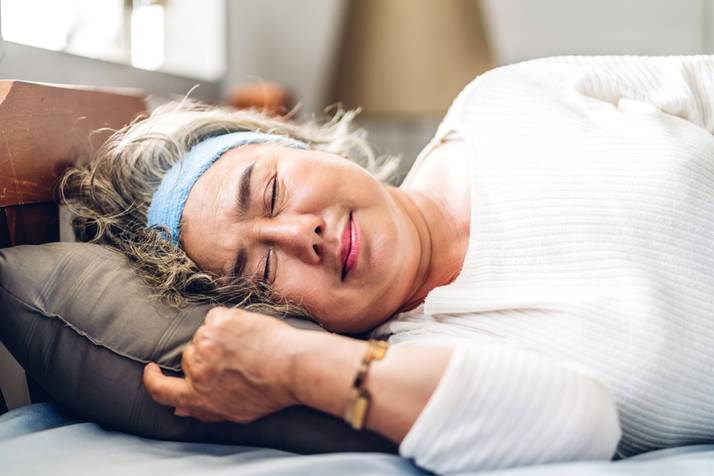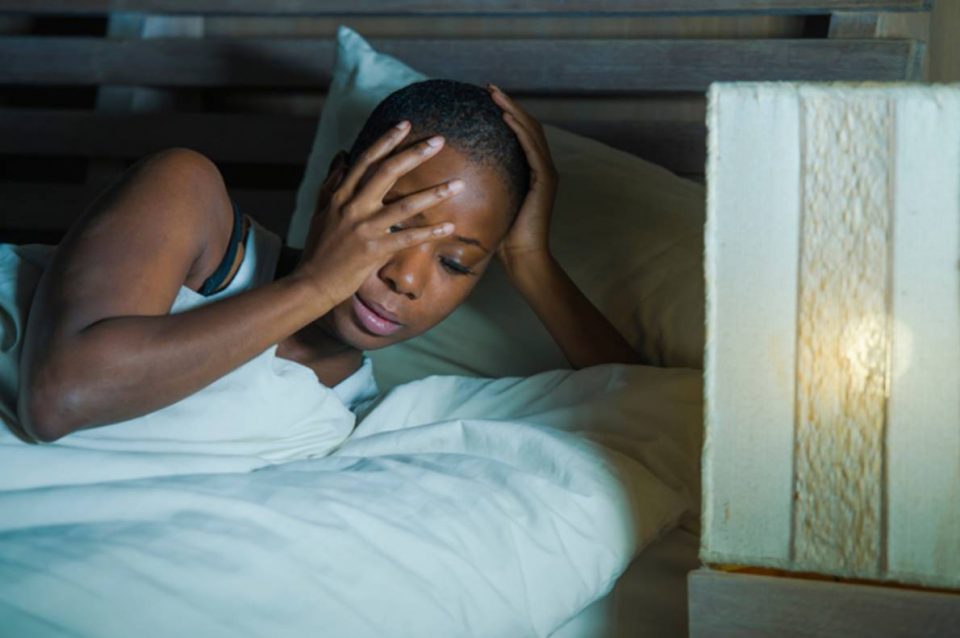Unfortunately, menopause and night sweats are just one of the ways that getting older can mess with a woman’s sleep cycle. If you’ve been struggling to sleep lately as a side effect of menopause, here are 12 steps you can take to fall asleep and stay asleep every night:
Table of Contents
Determine the cause of your sleep issues.
If you’ve been having trouble sleeping, it’s important to determine if your issues are actually caused by menopause or by other age-related health issues such as acid reflux, sleep apnea, or incontinence. If you can’t figure it out on your own, don’t be afraid to talk to your doctor. They will be able to run tests and potentially get you set up with prescription medications, a sleep apnea machine, bladder leakage pads, and other solutions.
Stick to a regular sleep schedule.
Going to bed and waking up at consistent times each day — yes, even on the weekends — will promote better sleep in the long run. Choose a schedule that you will mostly be able to stick to and do your best to stay consistent every single day. It will take some time to get your body used to the new schedule, but once you do, it will have a significant impact on your sleep.
Don’t nap in the afternoon.
Speaking of naps, you should try to avoid them, especially in the late afternoon and evening as you get closer to bedtime. Napping throws off your circadian rhythm and can make it more difficult to go to sleep at night, which rather defeats the purpose. Some people’s bodies work perfectly fine with a daily nap, while others feel worse after they nap, so know yourself and try not to nap if you know it makes you feel bad.
Put away screens.
You may love to watch TV before bed, but sadly, the light from your screens has been shown to keep you awake. At least an hour before bed, turn off the TV and put away your phone, tablet, and/or computer to give your eyes a break. Instead, do a calming activity that doesn’t involve the use of a screen, such as reading a physical book.
Exercise regularly, but not too late in the day.
Exercise is fantastic for promoting better sleep because it tires you out physically. However, it’s important not to workout too late in the day because all that moving around temporarily wakes you up. Exercise at slightest a couple of hours before bed to give your body time to calm down and get sleepy at a reasonable hour.
Watch your caffeine intake.
Caffeine can take up to 10 hours to leave the body, so it’s essential not to drink it after lunch if you’ve been having sleep problems. Even if you could previously drink a cup of coffee and go right to sleep, menopause can change the way your body metabolizes caffeine, so that might not be the case any longer. You might also poverty to look into cutting back on the number of cups that you drink or switching to a lower caffeine option (like green tea) to aid your sleep further.

Avoid large meals late in the day.
Eating a huge meal right before bed can cause indigestion, acid reflux, and other gastrointestinal issues that can keep you awake at night. Try to eat dinner several hours before bed to give yourself enough time to digest it. If you get hungry again earlier bed, have a small snack of something bland that you know won’t upset your stomach. Give yourself sufficient time to digest it before lying down so you don’t accidentally trigger acid reflux.
Take a cold shower.
Your body temperature lowers as you prepare to go to sleep, and you can help the process along by taking a cool shower right before bed. Note that the water should be cool, not cold, since cold water might shock you awake. Make sure to move slowly after the shower so you don’t raise your body temperature again. By cooling off with a shower before bed, you may also lower your chances of having night sweats, which are very disruptive to sleep.
Create a bedtime routine.
Doing the same set of activities every night before bed will help cue your body that it’s time to sleep. This routine can include activities such as changing into your pajamas, washing your face, and brushing your teeth. You should also have a morning routine, which will tell your body that it’s time to wake up instead.

Relax as much as possible.
Stress will make it difficult to fall and stay asleep, so deliberately relaxing before bed can make a difference. Pick an activity that works for you, whether that’s meditating or doing light yoga or reading a favorite book. Work it into your bedtime routine if possible so that your body starts to associate that activity with going to sleep.
Lower the thermostat at night.
Cold showers aren’t the only way to cool off at night. You will probably get pretty hot under the covers, so don’t be afraid to lower the thermostat, run the air conditioning, and/or turn on some fans to help keep the temperature at a reasonable level. You may need to do this an hour or two before bed during the hotter months to get the house to a comfortable temperature to sleep.
Choose breathable pajamas and sheets.
When getting dressed for bed, choose pajamas made of breathable fabrics such as cotton. These will help to vent heat and won’t trap sweat, which lowers your chance of getting a hot flash. You should also switch your sheets out for cotton fabric for this exact same reason. If you tend to sweat into your pajamas anyway, keep an extra set on hand so you can change in the middle of the night if you need to.
Follow these steps to get some menopause relief and sleep better at night. Just because menopause is an inevitable part of aging doesn’t mean that you can’t do anything about it!

